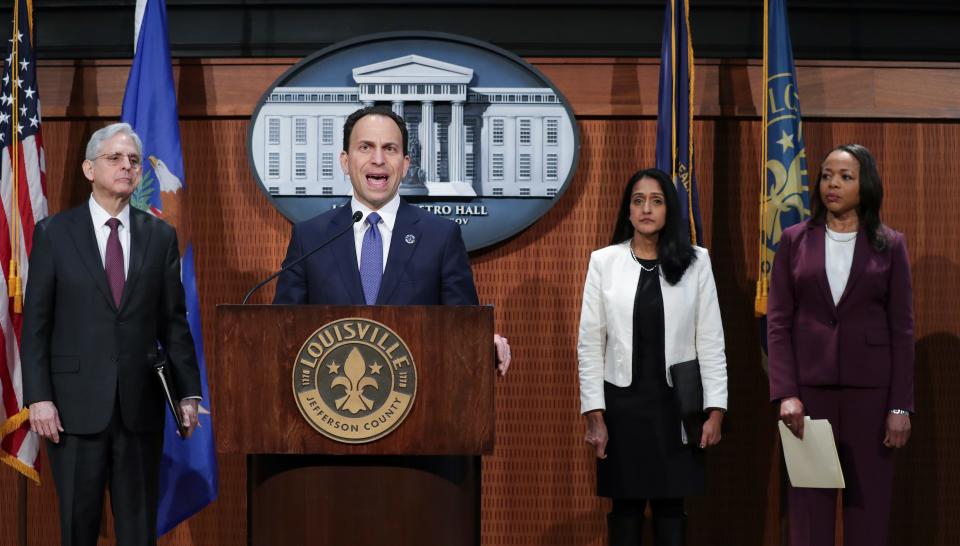What to know about the 7 DOJ findings in Louisville police investigation
The U.S. Department of Justice revealed its investigative report into the Louisville Police Department Wednesday, which found reasonable cause to believe city government and the department "engage in a pattern or practice of conduct that deprives people of their rights under the Constitution and federal law."
What are the main seven findings of the DOJ report into Louisville police?
LMPD uses excessive force, including unjustified neck restraints and the unreasonable use of police dogs and tasers.
LMPD conducts searches based on invalid warrants.
LMPD unlawfully executes search warrants without knocking and announcing.
LMPD unlawfully stops, searches, detains, and arrests people during street enforcement activities, including traffic and pedestrian stops.
LMPD unlawfully discriminates against Black people in its enforcement activities.
LMPD violates the rights of people engaged in protected speech critical of policing.
Louisville Metro and LMPD discriminate against people with behavioral health disabilities when responding to them in crisis
Here are more details from those seven findings:

'LMPD uses excessive force, including unjustified neck restraints and the unreasonable use of police dogs and tasers'
The DOJ found LMPD officers use "excessive force in violation of the Fourth Amendment" and "routinely use force disproportionate to the threat or resistance posed."
The report also found a lack of clear policy or property oversight in cases of excessive force, as "in the majority of the problematic incidents we evaluated, supervisors reviewed the conduct at issue but failed to identify the misconduct."
Specific incidents in the report included dangerous neck restraints, police dogs against people who pose nothreat, with dogs continuing to bite people after they surrender.

More:DOJ's report into Louisville police: How people are responding on social media
The report also details "unreasonable and unsafe" use of tasers, the use of "takedowns, strikes, and other bodily force in ways that are unnecessary and unlawful" and "escalating behavior that startles, confuses, or angers theindividuals they encounter."
'LMPD conducts searches based on invalid warrants'

The report found that LMPD "engages in a pattern or practice of seeking search warrants in ways that deprive individuals of their rights under the Fourth Amendment."
It added that "a significant number" of the department's search warrant applications "fail to satisfy theconstitutional requirement of being supported by 'probable cause.'"
The report detailed specific examples of how these applications "frequently lack the specificity and detail necessary to establish probable cause for the search, are typically overly broad in scope, and fail to establish probable cause for searching everything and everyone listed in the warrant."
'LMPD unlawfully executes search warrants without knocking and announcing'
The report found that when executing search warrants on private homes, LMPD officers "regularly fail to knock and announce their presence," adding "these unlawful practices endanger both officers and members of the public."
A review of warrants executed on residences from 2016 through 2021 found LMPD rarely (only 2.5% of the time) requested judicial authorization to execute a warrant without knocking and announcing, but they "still entered homes without knocking and announcing in more than half of the warrant executions we reviewed."
The report found those unlawful warrant executions "are the result of poor planning, supervision, andoversight," with the "routine failure to hold officers accountable for failing to complete risk matricesputs officers and the public in needlessly dangerous situations."
More:What they said: Notable quotes on Louisville police investigation
'LMPD unlawfully stops, searches, detains, and arrests people during street enforcement activities, including traffic and pedestrian stops'
The DOJ found LMPD officers "unlawfully stop, frisk, detain, search, and arrest people during street enforcement activities, such as traffic and pedestrian stops," with these "intrusive encounters" violating the rights of people throughout the city.
Documenting different incidents of "unlawful street encounters," the report added that they "are more than mere inconveniences — they can be invasive and humiliating" and "undermine public safety by poisoning the relationship between the police and community."
Related:Louisville police promised reforms on traffic stops. Is profiling still happening?
'LMPD unlawfully discriminates against Black people in its enforcement activities'
The DOJ found reasonable cause to believe LMPD "engages in racial discrimination in violation of Title VI of the Civil Rights Act of 1964 and the Safe Streets Act," as Black people "disproportionately experience" the conduct criticized throughout the report.
This includes officers disproportionately stopping Black drivers for minor traffic offenses and conducting searches, as well as prolonged detentions and arrests for marijuana possession and other minor misdemeanors.
The report noted one case where an officer described a Black teenager as a “wild animal that needs to be put down."
"In sum, LMPD’s inadequate and dismissive response to racial bias signals that discrimination is tolerated," stated the report. "LMPD’s tolerance of explicit racial bias within its ranks is further evidence of unlawful discrimination."
'LMPD violates the rights of people engaged in protected speech critical of policing'
The report found LMPD "often responds aggressively to police-related speech, including by taking actions that could deter a person from criticizing police or assembling in a group to do so."
While protests about policing can "pose unique challenges for law enforcement," the report adds that "these factors do not make police protests so inherently violent, lawless, or dangerous as to be entitled less First Amendment protection."
'Louisville Metro and LMPD discriminate against people with behavioral health disabilities when responding to them in crisis'
The report found LMPD violates the Americans with Disabilities Act by their responses to people with behavioral health disabilities.
"LMPD fails to reasonably accommodate individuals with behavioral health disabilities during encounters, leading to needless escalation, use of force, avoidable arrest, and serious injury," the report stated. "This discrimination can be avoided through expansion of current Louisville Metro programs, and reasonable modifications of LMPD’s and MetroSafe’s policies and practices."
Reach reporter Joe Sonka at [email protected] and follow him on Twitter at @joesonka.
This article originally appeared on Louisville Courier Journal: 7 main findings from the DOJ report into Louisville police department
